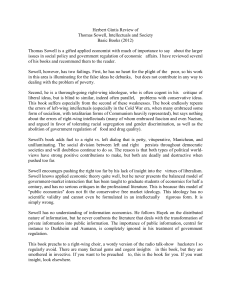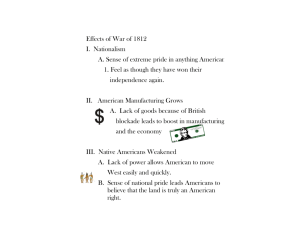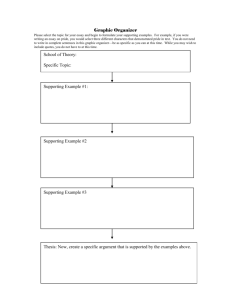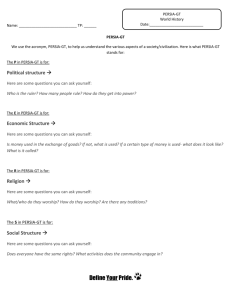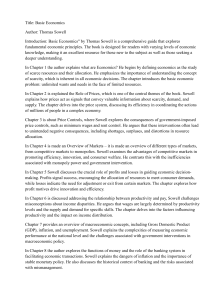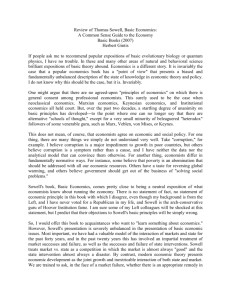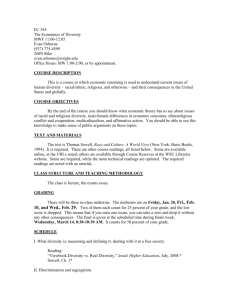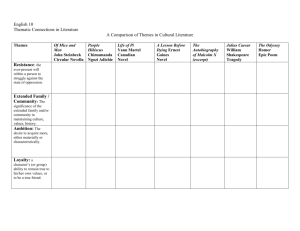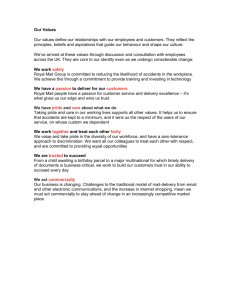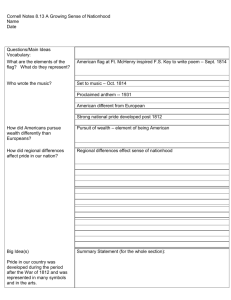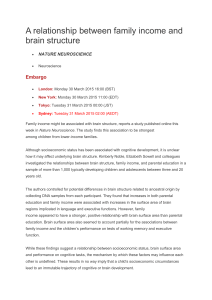“Needs”
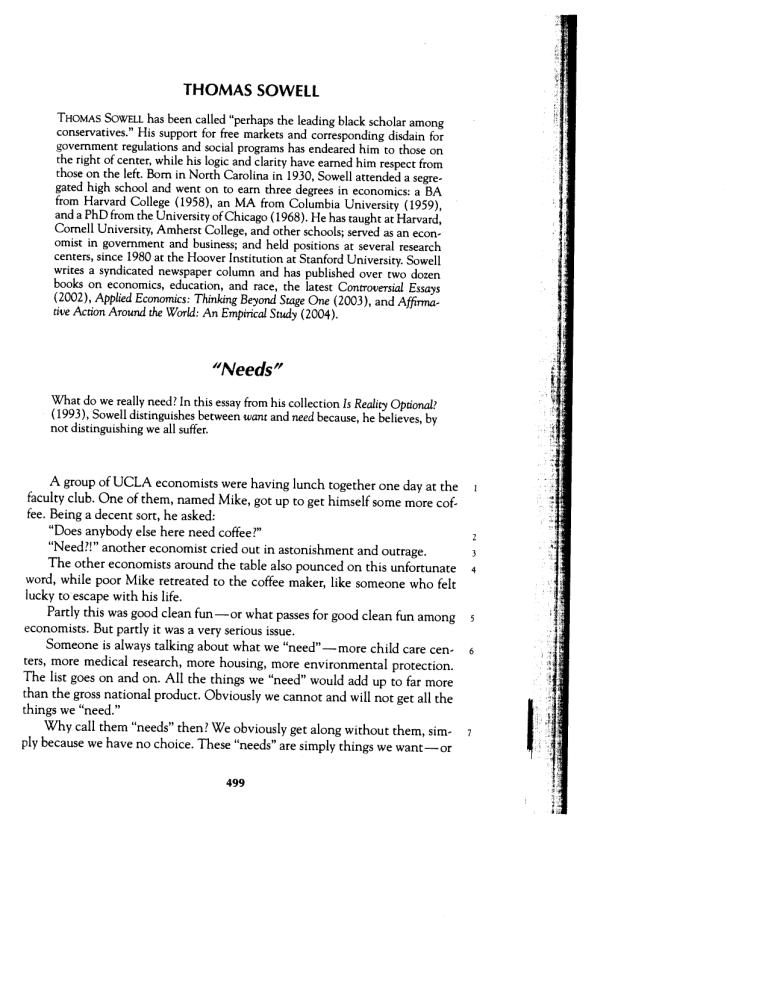
THOMAS SOWELL
THOMAS SOWELL has been called “perhaps the leading black scholar among conservatives.” His support for free markets and corresponding disdain for government regulations and social programs has endeared him to those on the right of center, while his logic and clarity have earned him respect from those on the left. Born in North Carolina in 1930, Sowell attended a segre gated high school and went on to earn three degrees in economics: a BA from Harvard College (1958), an MA from Columbia University (1959), and a PhD from the University of Chicago (1968). He has taught at Harvard,
Cornell University, Amherst College, and other schools; served as an econ omist in government and business; and held positions at several research centers, since 1980 at the Hoover Institution at Stanford University. Sowell writes a syndicated newspaper column and has published over two dozen books on economics, education, and race, the latest Controversial Essays
(2002), Applied Economics: Thinking Beyond Stage tive Action Around the World:
One (2003), and Affirma
An Empirical Study (2004).
“Needs”
What do we really need? In this essay from his collection Is
(1993), Sowell distinguishes between want and need not distinguishing we all suffer.
Reality Optional?
because, he believes, by
A group of UCLA economists were having lunch together one day at the faculty club. One of them, named Mike, got up to get himself some more cof fee. Being a decent sort, he asked:
“Does anybody else here need coffee?”
“Need?!” another economist cried out in astonishment and outrage.
The other economists around the table also pounced on this unfortunate word, while poor Mike retreated to the coffee maker, like someone who felt lucky to escape with his life.
Partly this was good clean fun—or what passes for good clean fun among economists. But partly it was a very serious issue.
Someone is always talking about what we “need”—more child care centers, more medical research, more housing, more environmental protection
The list goes on and on. All the things we “need” would add up to far more than the gross national product. Obviously we cannot and will not get all the things we “need.”
Why call them “needs” then? We obviously get along without them, simply because we have no choice. These “needs” are simply things we want—or
7
6
5
3
2
499
500 Definition that some of us want. Given that we cannot possibly have all the things we want, we have to make trade-offs. That is what economics is all about.
Words like needs, rights, or entitlements try to put some things on a pedestal, so that they don’t have to face the reality of trade-offs. This is part of the higher humbug of politics.
Surely some things are really needs, you might say. If that is true, food must be one of those needs, since we would die without it.
Huge agricultural surpluses are one result of this kind of mushy thinking.
There is obviously some amount of food that is urgently required to keep body and soul together. But the average American already takes in far more food than is necessary to sustain life
— and in fact so much food as to make his lifespan shorter than it would be at a lower weight.
Like virtually everything else, food beyond some point ceases to be as urgently demanded and even ceases to be a benefit. When it reaches the point of being positively harmful, it can hardly be called a “need.” That is why rigid words like need spread so much confusion in our thinking and havoc in our policies.
Prices force us into trade-offs, which is one of many reasons why the mar ketplace operates so muchmore efficiently than political allocation according to “need,” “entitlement,” “priorities” or other such rigid notions.
The real issue is almost never whether we should have nothing at all or some unlimited amount, or even some fixed amount of a particular good. The real issue is what kind of trade-off makes sense. That usually means having some of many things but not all we want of anything.
Prices tell us what the terms of the trade-offs are. Do we “need” more clothing? At some prices we do and at other prices we can get along with what we have. I happen to own three suits. But if clothing prices were one-tenth of what they are, I might have a wardrobe that would knock you dead.
My daughter used to make snide remarks about an old car that I drove for eight years. She stopped only when I told her that I could easily afford to get a new car, just by not paying her tuition. That’s what trade-offs are all about.
If the government were giving out cars to those who “needed” them, I could have written an application that would have brought tears to your eyes.
I could have gone on talk shows and worked up public sympathy over the ways my old jalopy was messing up my life—even threatening my life because the brakes failed completely twice.
If the taxpayers were paying for it, I would have “needed” a new car. But, since it was my money that was being spent, I had a brake job instead.
Politicians take advantage of our mushy thinking by promising to meet our “need” or by giving us a “right” or “entitlement” to this or that. But let’s
SoweH / “Needs”
501 go back to square one. Politicians don’t manufacture anything except hot air,
Every “need” they meet takes away from some other “need” somewhere else.
Every job the government creates is supported by resources taken out of the private sector, where those same resources could have created another job
— or maybe two other jobs, given the wastefulness of government.
“Needs” are a dangerous concept. Mike the economist suffered only a momentary embarrassment from using the word. Our whole economy and society suffer much more from the mindless policies based on such miscon ceptions.
19
20
For a reading quiz, sources on Thomas Sowell, and annotated links to further read ings on the concepts of wants and needs in economics, visit bedfordstmartinsxoml thebedfordreader.
I
Journal Writing
How would you define your own personal needs? In your journal, write about what you require for a comfortable and fulfilled Life. (To take your journal writi further, see
“From Journal to Essay” on the next page.)
Questions on Meaning
1. How does Sowell define the\iistomary use of needs?
definition?
at is distinctive about this
2. What would you say is Sowell’s u derlying
PURPO in offering his definition?
3. What does Sowell mean when he t s about
“t de-offs” (pars. 12—15)?
Questions on Wr’ in trategy
1. Why do you think Sowell begins his ssay with t e story of Mike and the other
UCLA economists? How does this s ry support his oint about needs?
2.
Why does Sowell put quotationsyarks around need the essay?
i his title and throughout
/
3. What is Sowell’s reason for wrijing about food in paragraphs —11 and his old car in paragraphs 15—17? Do you/hink these
EXAMPLES help clarify’his point?
4.
OTHER METHODS.
How ciSowell use
CAUSE AND EFFECT in paragraphs 18—20?
:
DAGOBERTO GlIB
DAGOBERTO GILB was born in Los Angeles in 1950 to a Mexican mother and a German American father. Though he admits to getting into trouble as a teen and says that he “wasn’t the best student at all,” he enrolled in junior college and went on to earn a BA in philosophy and an MA in religion from the University of California at Santa Barbara. From 1976 to 1991 GlIb pur sued a dual career as a carpenter and writer. The stories he wrote then and later, often focusing on working-class Latinos in the Southwest, have been collected in Winners on the Pass Line (1985), The Magic of Blood (1993), which received a PEN/Hemingway award, and Woodcuts of Women (2001). Gilb has also written a novel, The Last Known Residence of Mickey Acuna (1994), which was named a New York Times Notable Book, and a collection of essays, Gritos
(2003). Gilb has been a visiting writer at several universities and currently teaches in the creative writing program at Southwest Texas State University.
Pride
Gritos, Gilh’s essay collection and the source of this piece, takes its title from a Spanish word that translates loosely as “shouts” but more precisely, Gilb explains, as exclamations of “defiance and freedom,” “joy and support.” All these feelings figure in Gilb’s definition of pride through the lives of Mexican
Americans in El Paso, Texas.
It’s almost time to close at the northwest corner of Altura and Copia in El
Paso.
That means it is so dark that it is as restful as the deepest unremember ing sleep, dark as the empty space around this spinning planet, as a black star.
Headlights that beam a little cross-eyed from a fatso American car are feeling iround the asphalt road up the hill toward the Good Time Store, its yellow plastic smiley face bright like a sugary suck candy. The loose muffler holds
)nly half the misfires, and, dry springs squeaking, the automobile curves slowly into the establishment’s lot, swerving to avoid the new self-serve gas pump island. Behind it, across the street, a Texas flag—out too late this and ill the nights—pops and slaps in a summer wind that finally is cool.
A good man, gray on the edges, an assistant manager in a brown starched z md ironed uniform, is washing the glass windows of the store, lit up by as many watts as Venus, with a roll of paper towels and the blue liquid from a spray bottle Good night, m ijol’ he tells a young boy coming out after playing the video game, a Grande Guzzler the size of a wastebasket balanced in one hand, an open hag of Flaming Hot Cheetos, its red dye already smearing his
Spanish slang, “my son.”—EDS.
503
4
!
U
:1
1
=
504 Definition mouth and the hand not carrying the weight of the soda, his white T-shirt, its short sleeves reaching halfway down his wrists, the whole XXL of it billowing and puffing in the outdoor gust.
A plump young woman steps out of that car. She’s wearing a party dress, wide scoops out of the top, front, and back, its hemline way above the knees.
Did you get a water pump? the assistant manager asks her. Are you going to make it to Horizon City? He’s still washing the glass of the storefront, his hand sweeping in small hard circles.
The young woman is patient and calm like a loving mother. I don’t know yet, she tells him as she stops close to him, thinking. I guess I should make a call, she says, and her thick-soled shoes, the latest fashion, slap against her heels to one of the pay phones at the front of the store.
Pride is working a job like it’s as important as art or war, is the happiness of a new high score on a video arcade game, of a pretty new black dress and shoes. Pride is the deaf and blind confidence of the good people who are too poor but don’t notice.
A son is a long time sitting on the front porch where he played all those years with the squirmy dog who still licks his face, both puppies then, even be fore he played on the winning teams of Little League baseball and City League basketball. They sprint down the sidewalk and across streets, side by side, until they stop to rest on the park grass, where a red ant, or a spider, bites the son’s calf. It swells, but he no longer thinks to complain to his mom about it—he’s too old now—when he comes home. He gets ready, putting on the shirt and pants his mom would have ironed but he wanted to iron himself. He takes the ride with his best friend since first grade. The hundreds of moms and dads, ters, all are at the Special Events Center for the son’s high school graduation.
His dad is a man bigger than most, and when he walks in his dress eel-skin boots down the cement stairs to get as close to the hardwood basketball-court floor and ceremony to see
— m’ijo! —he feels an embarrassing sob bursting from his eyes and mouth. He holds it back, and with his hands, hides the tears are playing and laughing and they are so small and he is so big next to them.
And when his son walks to the stage to get his high school diploma and his dad wants to scream his name, he hears how many others, from the floor in caps and gowns and from around the arena, are already screaming it
— could be any name, it could be any son’s or daughter’s: Alex! Vanessa! Carlos! Verotv ica! Ricky! Tony! Estella! Isa! —and sees his boy waving back to all of them.
GiIb/Pride
505
Pride hears gritty dirt blowing against an agave whose stiff fertile stalk, so tall, will not bend—the love of land, rugged like the people who live on it.
Pride sees the sunlight on the Franklin Mountains in the first light of morning
—the love of culture and history. Pride smells a sweet, musky drizzle of rain and eats huevos con chile’ in corn tortillas heated on a cast-iron pan—the love of heritage.
Pride is the fearless reaction to disrespect and disregard. It is knowing the future will prove that wrong.
Seeing the beauty: Look out there from a height of the mountain and on the north and south of the Rio Grande, to the far away and close, the so many miles more of fuzz on the wide horizon, knowing how many years the people have passed and have stayed, the ancestors, the ones who have medaled, limped back on crutches or died or were heroes from wars in the Pacific or
Europe or Korea or Vietnam or the Persian Gulf, the ones who have raised the fist and dared to defy, the ones who wash the clothes and cook and serve the meals, who stitch the factory shoes and the factory slacks, who assemble and sort, the ones who laugh and the ones who weep, the ones who care, the ones who want more, the ones who try, the ones who love, those ones with shame less courage and hardened wisdom, and the old ones still so alive, holding their grandchildren, and the young ones in their glowing prime, strong and gorgeous, holding each other, the ones who will be born from them. The desert land is rock-dry and ungreen. It is brown. Brown like the skin is brown.
Beautiful brown.
io
9
8
For a reading quiz, sources on Dagoberto Glib, and annotated links to further read ings on Mexican Americans in the United States, visit bedfordstmartins.com/ thebedfordreader.
Journal Writing
In your journal, jot down images of pride that occur to you based on your own experi ences and observations. Then try briefly to create your own definition—or defini tions—of pride.
(To take your journal writing further, see “From Journal to
Essay” on the next page.)
Traditional Mexican dish of eggs and peppers.—EDs.
